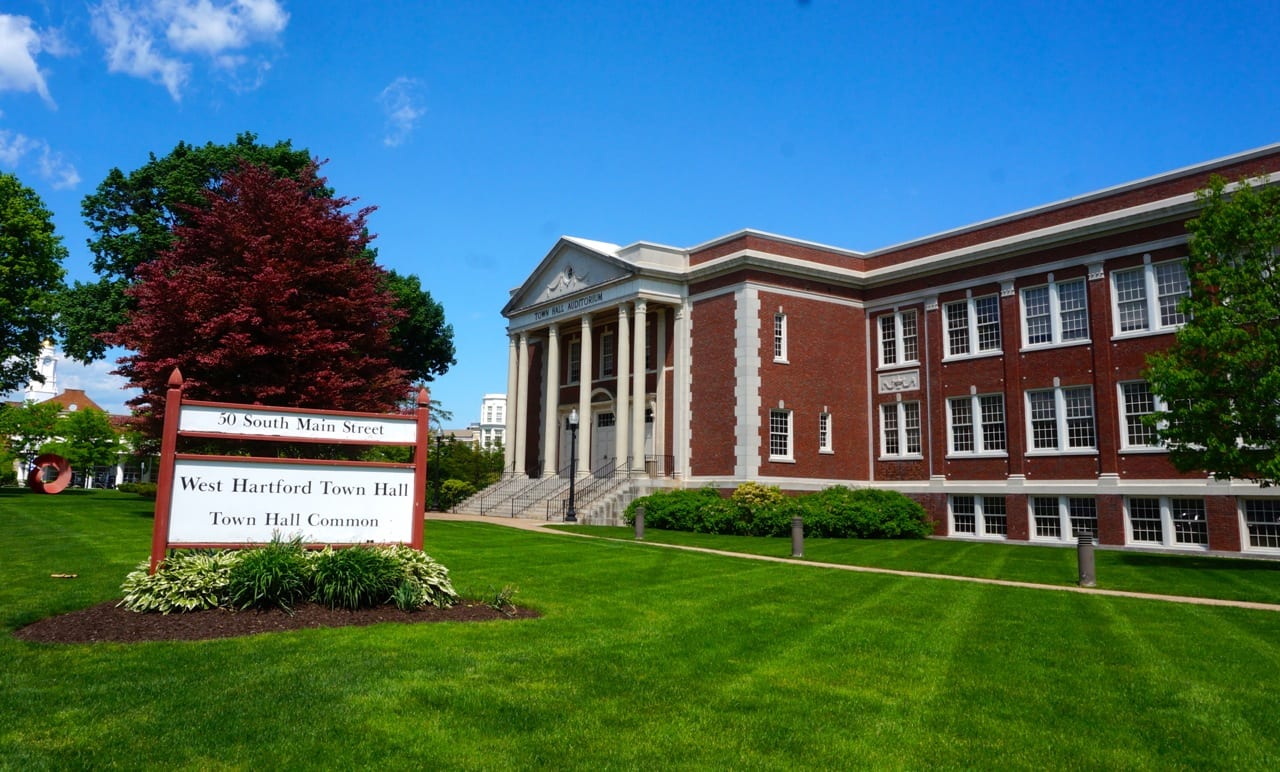Town Council Approves Ordinance to Permit Cottage Food Operations in West Hartford

Audio By Carbonatix

West Hartford Town Hall. Photo credit: Ronni Newton
West Hartford residents who would like to create and sell items that are are permitted under the Department of Consumer Protection’s definition of ‘cottage food’ will be able to do so in West Hartford.
By Ronni Newton
West Hartford residents who would like to launch a home-based food preparation and sales business will now be permitted to do so, provided the food that they are creating and selling fits within the Connecticut Department of Consumer Protection (DCP) definition of cottage food and proper licensing with the state and town is obtained.
The Town Council voted unanimously Tuesday night to approve the zoning ordinance amendment.
The impetus for the change was prompted by a request from a new resident, Jennifer Nelb, who moved from Vermont to West Hartford in August 2018.
“I love to bake and it has been a huge passion of mine,” Nelb told Council members at the first public hearing on the ordinance change, held on May 14. She said that she had a home-based business in Vermont, and knew that Connecticut had approved cottage food businesses effective Oct. 1, 2018.
When she moved to West Hartford in August 2018, however, Nelb said she was disappointed to find out that town ordinance would not permit her business. She approached the town and made staff aware of the change in the state law, and also reached out to her neighbors, whose only concern was traffic, Nelb said. She assured them that she was not planning to sell out of her home, but would be delivering her product.
The ordinance change was crafted following discussion in February by the Council’s Community Planning and Physical Services Committee.
“I really appreciate you guys listening to all of this,” Nelb said at the May hearing.
The hearing was continued to June 11 due to an earlier misunderstanding of one point by the Town Plan and Zoning Commission (TPZ), which then wanted time for additional review. TPZ offered gave a positive referral of the measure to the Town Council following its June 3 meeting.
“Cottage food,” as defined by DCP, is food that is “perceived tone low-risk for food-related injury or illness.” Included are many types of baked goods, granola, herbs and spices, and vinegars.
Cottage food operators, in order to be licensed with the DCP, must complete a food safety course and pay a $50 annual fee. Those with private sources of water must have the water tested in advance.
Prior to Tuesday night’s amendment, West Hartford’s zoning ordinance that applies to home-based businesses prohibited “the keeping of stock-in-trade or the sale, rental or holding for sale or redelivery of any merchandise, goods, products or equipment including but not limited to food.” The change removes that restriction for operations that meet the DCP’s definition of cottage food.
In order to operate in West Hartford going forward, cottage food operators must submit a Home Occupation Zoning Permit Application to the Planning and Zoning Division and pay a $135 fee. If customers are coming to the home, or if there are employees, a petition must be filed with the Zoning Board of Appeals.
Cottage food operators cannot have revenue in excess of $25,000.
Allowing cottage food operators is a “good way to spur entrepreneurship in town,” Director of Community Development Mark McGovern told the Council at the hearing, adding that he hopes some of the operators may eventually need commercial space.
Republican Council member Chris Williams, during the hearing, noted that the Council had received an email from a resident concerned about the impact of the ordinance on residents in multifamily buildings, in particular the overuse of gas ovens and ventilation issues.
McGovern said that he is not anticipating major operations due to the revenue cap, and while residents may have “commercial-like ovens,” any kitchen renovations must go through the permitting process and installation of ovens must follow manufacturer specifications. He said he is comfortable with the town’s enforcement procedures.
Williams asked how it would be enforced, and if notification of violations would happen when someone “sees people with pies” leaving a house and calls the town. McGovern said in reference to zoning violations, that “whether it”s tall grass or cookies, we deal with it the same way.”
Chuck Coursey, chair of the West Hartford Chamber of Commerce’s Economic Development Committee, and Chamber Executive Director Chris Conway, both voiced their support of the ordinance change in supporting cottage food operators as small business incubators.
“We did talk about this quite a bit in committee,” said Democrat Ben Wenograd, who chairs the Community Planning and Physical Services Committee. He said multiple scenarios were discussed, and the committee agreed that this would be a good economic development move.
“There are many, many businesses that were started in someone’s home,” Republican Mary Fay said, voicing her support for the measure and desire for more small businesses in town. She said she thinks these types of incubators are good, provided there is some sort of control.
“I wish you all the success in the world and I hope at some point your cottage business becomes a storefront business,” Democrat Dallas Dodge said, speaking to Nelb who was in the audience.
Mayor Shari Cantor thanked town staff for all their work developing the ordinance amendment, and said it was reviewed to get it “just right.” Brands like Stacy’s chips and Aunt Anne’s were developed as home businesses, Cantor said, and this is very good for entrepreneurship.
Click here to read the amended ordinance.
Like what you see here? Click here to subscribe to We-Ha’s newsletter so you’ll always be in the know about what’s happening in West Hartford!




[…] Dallas Dodge also thanked Norden for his investment. When the Council approved the Cottage Food Operations ordinance earlier in the month, he said, the goal was to provide a “food small business incubator. … My hope is that your […]